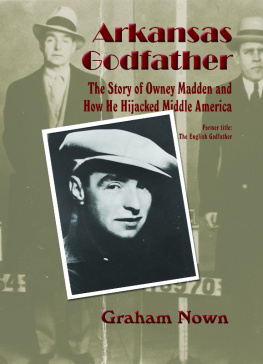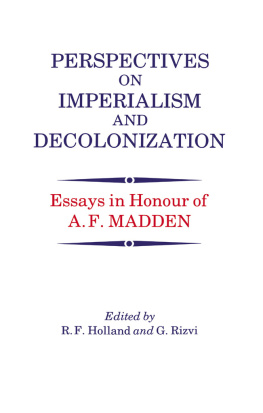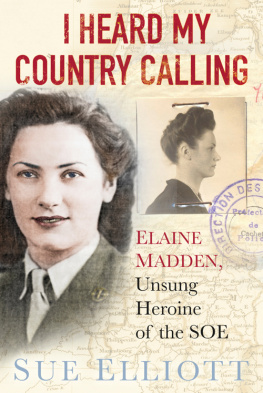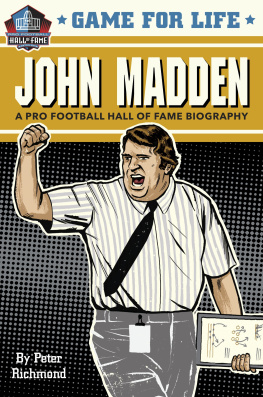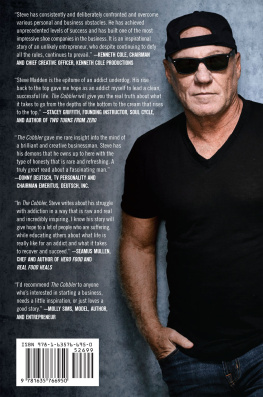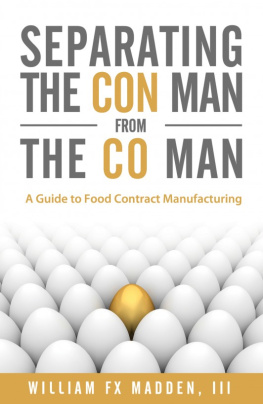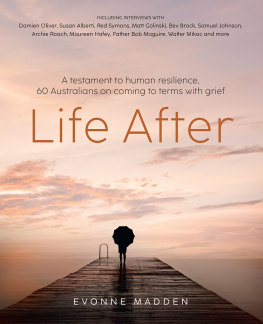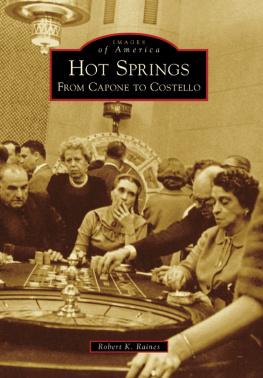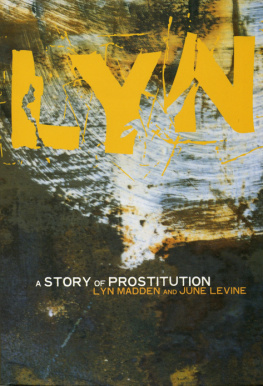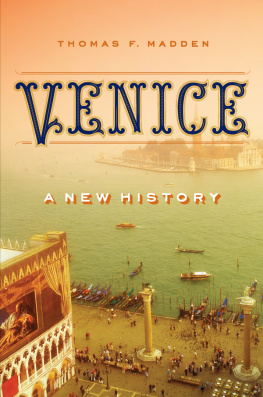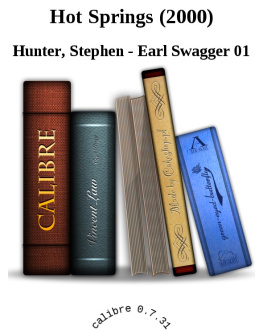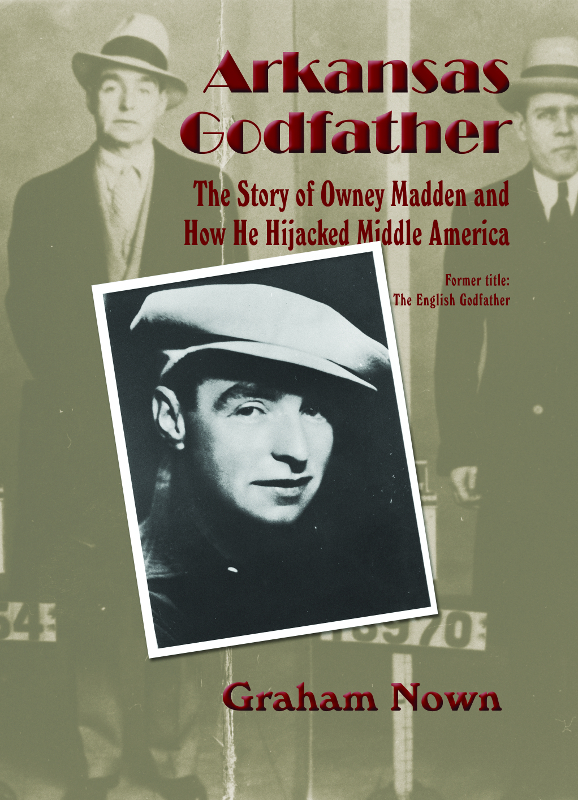
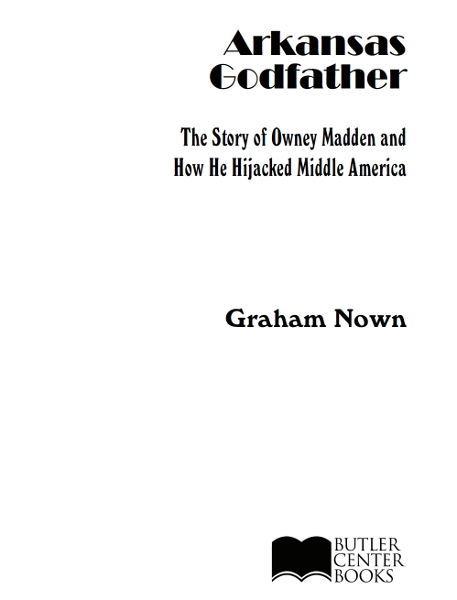
Copyright 2013 by Sylvana Nown
(Former title: The English Godfather, UK copyright 1987 by Graham Nown)
All rights reserved. Published by Butler Center Books, part of the Butler Center for Arkansas Studies, a division of the Central Arkansas Library System. No part of this book may be reproduced in any form, except for brief passages quoted within reviews, without the express written consent of Butler Center Books.

The Butler Center for Arkansas Studies
Central Arkansas Library System
100 Rock Street
Little Rock, Arkansas 72201
www.bultercenter.org
First Printing: April 2013
ISBN 978-1-935106-51-7
e-ISBN 978-1-935106-57-9
Project director: Rod Lorenzen
Proofreader: Ali Welky
Library of Congress Cataloging-in-Publication Data
Nown, Graham.
[English godfather]
Arkansas godfather : the story of Owney Madden and how he hijacked Middle America / Graham Nown.
pages cm
Originally published under title: The English godfather. London : Ward Lock, 1987.
Includes .
ISBN 978-1-935106-51-7 (pbk. : alk. paper)
1. Madden, Owney, 1891-1980. 2. CriminalsNew York (State)New YorkBiography. 3. CriminalsArkansasHot SpringsBiography. I. Butler Center for Arkansas Studies, issuing body. II. Title.
HV6248.M245N68 2013
364.1092dc23
[B]
2013001989
The publishing division of the Butler Center for Arkansas Studies was made possible by the generosity of Dora Johnson Ragsdale and John G. Ragsdale Jr.
Contents
O ur fascination with gangsters and the sinister lives they pursue never seems to end. For the better part of one hundred years now, gangsters have been glamorized in film and fiction despite the terrible crimes they commit and the violence they perpetuate. In the American psyche, they seem to function like shadow selves by defying convention and living just outside the law. Vicariously, we live through them, maybe feeling a bit of envy for those who can make a living on their own terms, legal or not. Successful mobsters enforce the idea that criminality exists not as the exception but as the rule and that people can break the law without ever getting caught. Sometimes, the criminal life is totally entwined in government and society, so much so that one might wonder about what is law and what isnt.
The world of organized crime is oddly compelling, and we want to know what gangsters do and how they live. This is how it was for Graham Nown, an enterprising British journalist and eloquent broadcaster. He was a smart, engaging man who was liked by all, and his journey into the underworld of organized crime started innocently enough. Fueled by a reporters insatiable curiosity, he spent four years tracking down the truth about a former countryman who later became one of Americas most notorious criminals. Where many others had failed to get the goods on Owney Madden, Graham Nown succeeded, and, above all, this is his story.
Nowns book about Madden, The English Godfather, first appeared in Great Britain in 1987. It was never distributed in the United States, and the public here learned of it only by word of mouth. A few libraries acquired it, but those interested in owning a copy had to pay an exorbitant sum for it through rare-book dealers. With the publication of this new, indexed edition, an extraordinary piece of American history is now preserved, thanks to Sylvana Nown, Graham Nowns widow, who allowed us to reprint her late husbands book. An author herself, she also collated all of Nowns research on Madden, who was born in Leeds in the north of England. Maddens family, originally from Ireland, later lived for a few years in Wigan, a town in Greater Manchester, England, before immigrating to the Hells Kitchen area of New York City.
By 1980, Nown was a journalist based in Wigan and was acquiring a finely tuned antenna for the unusual and quirky. His interest in gangsters was piqued by the memories of an old man in Wigan who once had dinner in Hot Springs, Arkansas, with Madden. He recalled that Madden spoke of nothing but his boyhood days in England. Later, Nown was bemused to find that, in researching Madden, he actually had discovered a love story involving a notorious underworld figure from New York who moved to a small resort town in the middle of the country and married the daughter of the postmaster. Nown showed up in Hot Springs in the mid-1980s, determined to track down and interview Maddens widow, Agnes, who still lived just outside the downtown area in the same house she had shared with her gangster husband, dead since 1965. Day after day, Nown knocked on the front door of the Madden home on West Grand Avenue, only to be turned away every time by the bodyguard, Roger Rucker. Mrs. Madden, who had never discussed her infamous husband with any outsider, finally relented after talking with Nown on the phone.
Roger Rucker told Graham that she would never have consented to meet him if she hadnt heard him speak, recalls Sylvana Nown. He said that Grahams voice on the phone had brought tears to her eyes because he sounded just like her Owney. She had never heard anyone else with a northern English accent. Because of her involvement in her late husbands business deals, Agnes herself was practically a real part of the mob. Now, would their vaunted code of silence finally be broken? And what would Nown find when he walked into the home of a mobster whose career in organized crime had spanned five decades?
In the America of the Depression-era 1930s, crime often seems to fill the main news headlines. It is irresistible for reporters and sells lots of papers. The criminals are usually taking matters into their own hands and thwarting a government that has been pushed to the verge of collapse. A cast of well-known thugsBonnie and Clyde Barrow, Al Capone, and Pretty Boy Floyd among themdominates the news, and criminals often become folk heroes of sorts in the popular imagination. In New York City, Owney Madden is the undisputed champion of crimethe Duke of the West Side. He is the prototypical gangster, the first to wear expensive suits and insulate himself from the physical violence of the gang life by using intermediaries.
Big-time gangsters like Madden suddenly found themselves with large piles of cash, mainly from bootlegging during Prohibition, but are denied entry into New Yorks high society. One remedy for this was to buy a nightclub and supply the booze so the society people would come to them. And come they did. Madden bought a nightclub in the African American community of Harlem from former heavyweight boxing champion Jack Johnson and renamed it the Cotton Club. There, Madden sold his own beerMaddens Number Onemanufactured in an illegal brewery protected by New Yorks finest. Even though the club was in a black neighborhood, it was off-limits to black patrons. This was a whites only club, and the only exceptions were the staff and the performers, including such greats as Cab Calloway, Louis Armstrong, Duke Ellington, and Billie Holiday.
Madden was the unlikeliest gangster, Nown liked to recall, a reclusive oddball who clung to his British passport, spoke in soft, rounded Yorkshire vowels with a hint of his Irish parentage, wore a flat cap as his trade-mark and bred pigeons.
Prohibition and illegal booze made him one of the biggest gangsters in America. Madden, also nicknamed the Killer, had already served time in prison for the murder of rival gang leader Little Patsy Doyle, and, in the early 30s, the law began to close in on him once again. He finally concocted an amazing secret dealworth one million dollars according to Nownwith state prosecutors that allowed him to escape further prosecution and have himself banished forever to the quieter environs of Hot Springs, a resort town nestled in the hills of central Arkansas. It is the town where, decades later, Maddens shadow would finally fall across Nowns path.
Next page
